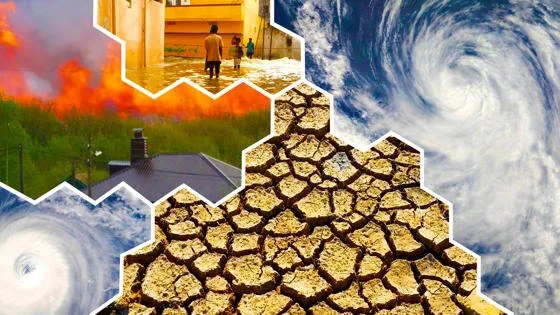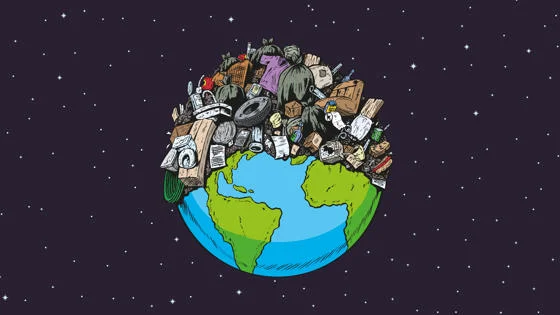Coronavirus must be a lesson on how we respond to climate change

Contents
When lockdown orders were put in place in many states of America to slow the spread of COVID-19, the US saw a dramatic drop in economic activity, with 22 million new claims for unemployment benefit in a single month.
While some argue that such a drastic economic change was unavoidable given the nature of the crisis, Dr Elliott says the descent into poverty for so many should be a warning for how we prepare for future disasters: "The decades-long fraying of the social safety net, particularly in the US and the UK, has meant that more people have very quickly been plunged into desperate conditions, struggling to buy even the bare minimum of what they need.
"Welfare programs that require onerous demonstrations of eligibility or merit are not responding to their needs quickly enough. These are not the conditions that help people to withstand major shocks and strain from coronavirus or climate change."
Perhaps (the pandemic) is taking some of the sting out of the perceived sacrifices that seem to accompany climate change; we are learning that we can let go of some things that were perhaps not serving us especially well to begin with.
Natural disasters can change policy
Emergency financial packages, such as a form of universal basic income in the US, have been introduced to compensate for weaknesses in the state welfare. In the past, Dr Elliott says such measures have reframed what is politically possible and led to a long-term policy change.
"Disasters, floods, earthquakes, fires, and economic depressions have a way of leading the public and policymakers to suspend ideological commitments that would otherwise militate against big spending and the redistribution of resources across the population.
"These extreme events can be important inflection points for the development of welfare states, providing policy precedents for expanding social provision. They can also foster a language for talking about mutual aid and compassion."
COVID-19 has also imposed limits on individual freedoms that have, until recently, been taken for granted. Dr Elliott’s current project involves analysing almost 10,000 social media posts from March 2020 linking COVID-19 to climate change. Her aim is to explore how people are making sense of both crises by relating them to each other: in what ways are they similar or different? Do people use one crisis to characterise, understand, or learn from the other?
If business-as-usual manufacturing resumes after the pandemic is under control, there is no reason to expect that emissions won't come bouncing back as everyone gets back to a problematic ‘normal’.
How has the pandemic changed behaviour?
"This pandemic is teaching us about processes of ‘defection’ from certain practices" she says. Understanding more about how and why it is that we have been able to let go of doing certain things, she hopes, can enable us to encourage behaviour changes when it comes to climate change as well.
The early results, she says, are giving her grounds for optimism: "Lots of people were tweeting about how their individual behaviour had changed in ways they felt were for the better. People were talking about learning what kinds of goods and activities are really essential to their wellbeing and about how work might be better balanced with care and leisure."
The kind of changes that reduce our consumption are a significant component of any response to the climate change crisis. Dr Elliott says: "Perhaps all this is taking some of the sting out of the perceived sacrifices that seem to accompany climate change; we are learning that we can let go of some things that were perhaps not serving us especially well to begin with, and live better lives for it. Sweeping changes to consumption habits are within our reach, it turns out."
But is it enough to reduce climate change?
While these changes are helpful, Dr Elliott stresses that any effective response to climate change will ultimately come at the level of international governments and economic systems.
"The fact that we can't all get on planes for weekend getaways has done something for lowering greenhouse gas emissions, but the slowdown or complete stop of some forms of manufacturing has done more.
"So if business-as-usual manufacturing resumes after the pandemic is under control, there is no reason to expect that emissions won't come bouncing back as everyone gets back to a problematic ‘normal’. Examining our individual consumption is important, we also need to think more systemically about how new or renewed commitments to greening our economy will be part of any plan for recovery."
Dr Elliott adds that COVID-19 should act as a warning for governments who are tempted by short-term fixes while they wait for the next crisis. "Coronavirus has already compounded existing vulnerabilities. A COVID-19 recovery plan that responds to the economic devastation of coronavirus, but doesn't address the climate crisis, is one that will not actually make people meaningfully secure over the longer term."
This film can also be viewed on LSE Player.
Rebecca Elliott was speaking to Peter Carrol, Media Relations Officer at LSE.
Image: David Watkis/Unsplash.
Download a PDF version of this article




